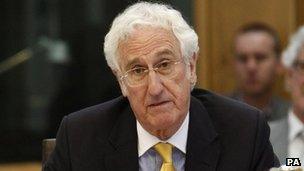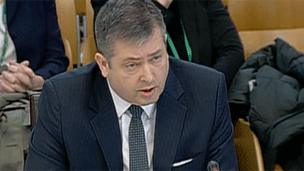Judge Lord Gill says corroboration rule should not be abolished
- Published

Lord Gill came before MSPs at the Scottish Parliament
Scotland's most senior judge has told MSPs the concept of corroboration in the criminal justice system should not be abolished.
The comments by Lord Gill, the Lord President, echoed those of other senior legal figures, including Lord Hope.
Corroboration, which is the need for evidence in criminal trials to come from two sources, has been a requirement in Scots law for centuries.
The Scottish government wants to remove it to allow more cases to proceed.
Lord Advocate Frank Mulholland, who has also been giving evidence to Holyrood's justice committee, said that in the past two years more than 2,800 cases of domestic abuse had been unable to proceed to court because of a lack of admissible evidence.
However, Lord Gill insisted that corroboration was a hallmark of Scottish law that should remain.
'Adverse consequences'
He said it was "always wise" to review the rules of the law, but he believed the proposed change to corroboration had not been thought through, and if abolished its consequences could be "very, very adverse".

Lord Advocate Frank Mulholland has been giving evidence to Holyrood's justice committee
He told the committee: "I don't think this will improve the quality of justice in Scotland in any way.
"I think there is a very serious risk there will be fewer convictions, and I also think that if you make this change in isolation, without looking at the wider picture, there are consequences that at the moment are unknowable but could be very adverse to the system.
"By and large we do not have many miscarriages of justice in Scotland and when they are discovered we put them right. There are very few. My fear would be there will be many more if corroboration is abolished."
He added that scrapping corroboration "might increase the number of prosecutions" but said he was "certainly not convinced it will increase the number of convictions".
Lord Gill said all but one of the country's judges were opposed to it being abolished.
He added: "Where there is such a degree of opposition, it should give us pause for thought."
The Scottish government wants to abolish corroboration, partly to improve the chances of increasing the conviction rate in cases of sexual crime and domestic abuse.
Access to justice
Mr Mulholland said he supported the move because it would provide access to justice for victims.
He added that over the last two years about 13% of rape cases - approximately 170 - reported to the Crown could not be proceeded with because of the requirement for corroboration.
Mr Mullholland then told MSPs about a case he had prosecuted where two sisters had been sexually abused as children over a number of years by a relative.
The girls were told as children that no one would believe them, but as adults they made a complaint to police, said the Lord Advocate.
He went on: "We took the case up, we indicted the case in the High Court and we were prepared to proceed to trial. But one of the complainers, one of the victims, mentally could not go ahead with it.
"We tried to support that victim through the process, give her as much support as was necessary. But at the end of the day we couldn't force that woman to give evidence. The effect of that meant the whole case fell."
Proposals to drop it are among a series of reforms contained in the Scottish government's Criminal Justice Bill, external.
Conservative MSP Margaret Mitchell asked the Lord President whether he felt the matter of corroboration should be taken out of the bill and dealt with separately.
He told the committee that would be a wise way of proceeding, and it could be examined quickly.
- Published21 June 2013
- Published20 June 2012
- Published16 April 2013
- Published13 December 2011
- Published17 November 2011